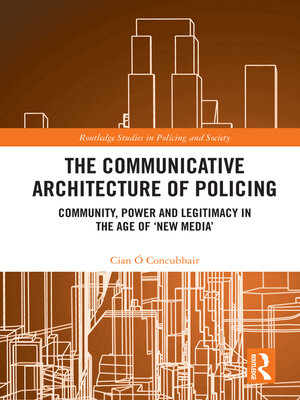The Communicative Architecture of Policing
ebook ∣ Community, Power and Legitimacy in the Age of 'New Media' · Routledge Studies in Policing and Society
By Cian Ó Concubhair

Sign up to save your library
With an OverDrive account, you can save your favorite libraries for at-a-glance information about availability. Find out more about OverDrive accounts.
Find this title in Libby, the library reading app by OverDrive.



Search for a digital library with this title
Title found at these libraries:
| Library Name | Distance |
|---|---|
| Loading... |
The Communicative Architecture of Policing is a ground-breaking study of police communications and police–media relations in the social media era. It is based on nearly a decade of research on police–media relations, including two years of extended observational study in local newsrooms and police communications departments, and dozens of interviews with police communicators, chief police officers and journalists. This book is the first to undertake a deep ethnography of both police communications and local news media in a single policing area. It also provides an innovative theoretical reappraisal of the mechanics of police–media power relations, grounded in ideas of legitimacy, mass communications and local governing power.
The book describes the lived experiences of journalists through the collapse of the local news media in England: declines wrought in large part by the advent of social media. It also describes a crisis of confidence in local journalism and its perceived institutional status in the local community. By contrast, the book charts the emergence of an empowered, professional police communicator class in policing––and its distinctive cultural features––rooted in the mass communications potential of social media. The book weaves together these empirical insights by developing novel approaches to police legitimacy theory and institutional power relations.
This book will be of interest to students, scholars and practitioners in the fields of criminology, media studies, communication studies, journalism and policing.







